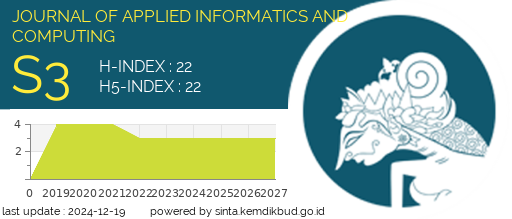Analisis Perbandingan Algoritma Untuk Prediksi Performa Akademik Mahasiswa Pada Pembelajaran Daring
DOI:
https://doi.org/10.30871/jaic.v6i2.4854Keywords:
Academic Performance, Machine Learning, Online Learning, AlgorithmsAbstract
Student academic performance is one of the important factors for student graduation. Therefore, many studies have been conducted in the field of education to identify factors that affect student performance. This research focuses on academic performance in online learning conditions by studying cases at XYZ university. Data were collected using Machine Learning techniques with the application of the Distributed Random Forest model, Naïve Bayes, Generalized Linear Model, and Gradient Boosting Machine algorithms. The results of this study indicate that the Distributed Random Forest and Gradient Boosting Machine models have an average accuracy of 99.83%. Researchers found variables that affect student learning performance, especially online learning, are final exam scores, midterm scores, attendance, assignment scores, amount of material given, number of assignments given, and number of clicks on material. From these findings, the researcher recommends that to improve the performance of the next learning, the implementation of learning should focus on improving the implementation of the Final Exams and the material on the learning platform
Downloads
References
K. Sunday, P. Ocheja, S. Hussain, S. S. Oyelere, B. O. Samson, and F. J. Agbo, "Analyzing Student Performance in Programming Education Using Classification Techniques," International Journal of Emerging Technologies in Learning (iJET), vol. 15, no. 02, p. 127, 2020, doi: 10.3991/ijet.v15i02.11527.
S. Sinche et al., "Analysis of Student Academic Performance Using Human-in-the-Loop Cyber-Physical Systems," Telecom 2020, Vol. 1, Pages 18-31, vol. 1, no. 1, pp. 18"“31, 2020, doi: 10.3390/TELECOM1010003.
E. Fernandes, M. Holanda, M. Victorino, V. Borges, R. Carvalho, and G. van Erven, "Educational data mining: Predictive analysis of academic performance of public school students in the capital of Brazil," J Bus Res, vol. 94, no. August 2017, pp. 335"“343, 2019, doi: 10.1016/j.jbusres.2018.02.012.
L. H. Son and H. Fujita, "Neural-fuzzy with representative sets for prediction of student performance," Applied Intelligence, vol. 49, no. 1, pp. 172"“187, 2019, doi: 10.1007/s10489-018-1262-7.
M. Norouzi et al., "Model of Learning Management System for Self- Directed Learning," ISSN International Journal of Information Dissemination and Technology International Journal of Information Dissemination and Technology, vol. 4, no. 4, pp. 2229"“5984, 2014.
A. Rivas, J. M. Fraile, P. Chamoso, A. González-Briones, S. RodrÃguez, and J. M. Corchado, "Students Performance Analysis Based on Machine Learning Techniques," in Learning Technology for Education Challenges, 2019, pp. 428"“438.
U. Fayyad, "Knowledge Discovery In Databases : An Overview," in Relational Data Mining, Springer, 2001, pp. 28"“47.
R. Lior and O. Maimon, Data mining with decision trees: theory and applications, 2nd ed., vol. 81. Singapore: World Scientific Publishing Co. Pte. Ltd, 2014.
A. J. Bowers and X. Zhou, "Receiver Operating Characteristic (ROC) Area Under the Curve (AUC): A Diagnostic Measure for Evaluating the Accuracy of Predictors of Education Outcomes," J Educ Stud Placed Risk, vol. 24, no. 1, pp. 20"“46, 2019, doi: 10.1080/10824669.2018.1523734.
N. I. Jha, I. Ghergulescu, and A. N. Moldovan, "OULAD MOOC dropout and result prediction using ensemble, deep learning and regression techniques," CSEDU 2019 - Proceedings of the 11th International Conference on Computer Supported Education, vol. 2, no. Csedu, pp. 154"“164, 2019, doi: 10.5220/0007767901540164.
M. Kubat, An Introduction to Machine Learning Second Edition. 2017.
B. G. Marcot and A. M. Hanea, "What is an optimal value of k in k-fold cross-validation in discrete Bayesian network analysis?," Comput Stat, no. 0123456789, 2020, doi: 10.1007/s00180-020-00999-9.
D. C. Duygu, N. AlkiÅŸ, and S. Ozkan-Yildirim, "A structural model for students' adoption of Learning Management Systems: An empirical investigation in the higher education context," Educational Technology and Society, vol. 21, no. 2, pp. 13"“27, 2018.
M. A. López Garrido, E. Y. Morales Mateos, J. A. Hernández Aguilar, C. A. Ochoa OrtÃz, C. González Constantino, and O. A. González González, "Patterns of Motivational Orientation and its Relationship with Academic Performance in University Students," Research in Computing Science, vol. 148, no. 6, pp. 197"“203, 2019, doi: 10.13053/rcs-148-6-14.
Downloads
Published
How to Cite
Issue
Section
License
Copyright (c) 2022 Herman Herman, Yefta Christian

This work is licensed under a Creative Commons Attribution-ShareAlike 4.0 International License.
Authors who publish with this journal agree to the following terms:
- Authors retain copyright and grant the journal right of first publication with the work simultaneously licensed under a Creative Commons Attribution License (Attribution-ShareAlike 4.0 International (CC BY-SA 4.0) ) that allows others to share the work with an acknowledgement of the work's authorship and initial publication in this journal.
- Authors are able to enter into separate, additional contractual arrangements for the non-exclusive distribution of the journal's published version of the work (e.g., post it to an institutional repository or publish it in a book), with an acknowledgement of its initial publication in this journal.
- Authors are permitted and encouraged to post their work online (e.g., in institutional repositories or on their website) prior to and during the submission process, as it can lead to productive exchanges, as well as earlier and greater citation of published work (See The Effect of Open Access).











